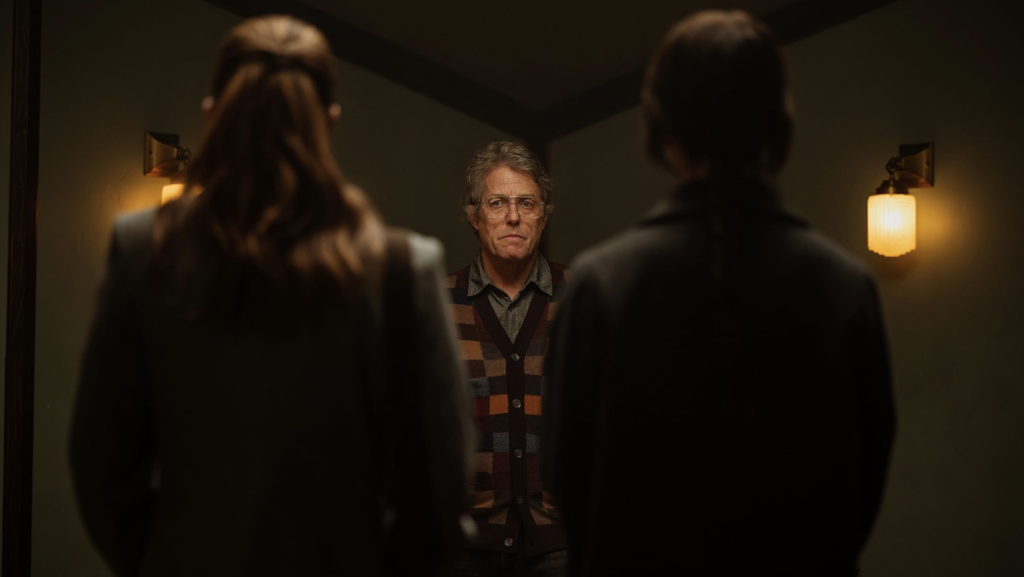At a party I attended not too long ago, the conversation steered most unwillingly to religion. The stranger asked if I was religious, a status I conceded in that halted, Hollywood sort of manner. He replied that he was an atheist, a position he’d reached after reading the Talmud, Bible, and Koran and finding the lot wanting.
I argued this was a terrible way to go about it: Sometimes context matters just as much as the text; if you read “Animal Farm” without working knowledge of Joseph Stalin, you might walk away with a wacky tale about pigs in top hats.
I couldn’t help reliving this conversation throughout the runtime of A24’s “Heretic,” which details the worst case scenario of such Reddit autodidactism.
The film follows Sister Barnes (Sophie Thatcher) and Sister Paxton (Chloe East), two young Latter-Day Saints out on their mission. They haven’t had much success, which is surprising because if either of these actresses evangelized at this reviewer’s door, I’d likely be writing for a different publication.
Sister Paxton is the cradle Mormon, all sugar and rainbows and blonde optimism. Sister Barnes is a convert and thus more streetwise and cynical, the “bad cop” of the partnership. Their final stop after a long day of rejection is one Mr. Reed’s house. Reed (Hugh Grant), seems friendly enough, inviting the girls into his rustic abode with the promise of theological discussion and blueberry pie.
Reed is like the man above, a self-described searcher for the divine while never satisfied with the answers given. He too has read the Abrahamic trilogy, and as it turns out, the Book of Mormon. His questions switch gears from inquisitive to inquisitional, with the girls not having many rebuttals to his pointed questions about the church’s shady history.
But poking apart Mormon theology is hardly difficult or sporting, and what was supposed to be a conversation feels all the more like a grown man bullying a couple of college students, like a more nefarious Ben Shapiro video. His increasingly hostile questions raise some silent questions from the girls, like: where is the wife he promised was just in the other room? Why is he so reluctant to let them leave? And just what sort of captive audience does he have in mind?
Hugh Grant, for his part, has spent most of the last 30 years stammering and charming his way into American hearts and increasingly larger houses. Now in the back nine of his career, he has decided to weaponize and thus destroy that goodwill. His last several roles have flipped the rock on the persona to reveal the dirty old man beneath, which such mannerisms usually disguise. After all those weddings he's finally getting to the funeral, and it’s more fun than he’s had in years.
Grant is the best part of the film, a charming rake even when the story inevitably plunges into bloody Hell. As it turns out, Reed isn't interested in conversation as much as an...experiment, where he will decide once and for all if his own theory on religion passes muster.
Reed is clever, which is quite distinct from intelligent. It’s easy to fall for Grant’s soothing cadence, while his sophisticated arguments don’t invoke contemplation but déjà vu, a Proustian sense memory back to your freshman roommate’s laundry bin.
Lesser films would have let him get away with it. But to its credit, “Heretic” doesn’t. The missionaries might not be able to explain away polygamy, but they can at least rebut that crock of nonsense about Jesus getting stolen from Horus. Reed doesn’t care for this; he’s unable to improvise from his lecture, or account for new arguments than the ones he already rehearsed and won in the shower.
Once past the stellar first act, the film feels similar, carefully rehearsed and not able to anticipate the spontaneity of human nature. Our characters crumble into symbols, mere vehicles for monologues even as they lie bleeding out. Part of the human element missing is a true understanding of religion.
You don’t have to understand religion to understand it, if that makes sense. It simply means taking the believer at their word that they actually believe it. There’s dialogue near the end that encapsulates my frustrations, where one of the missionaries admits she doesn’t believe prayer works. To her it’s just a way to think of others and be kind, and at the end of the day isn’t that what religion is all about?
Pope Francis warns of this mentality, where faith isn’t accepted on its own terms but rather as a “spiritual NGO,” and in which religion is seen as just an excuse for good works. (Flannery O’Connor’s line about the Eucharist, “If it’s a symbol then to hell with it,” comes to mind.) Religion can be slandered in a myriad of ways, but the most insulting name you can call it is “useful.” If that’s all it is, there are more useful ways of being useful.
The film tries to adopt a principled agnosticism, but part of that equation is tolerating the possibility, indeed the sheer terror, of God being real. Despite the filmmakers' offers of diplomacy, they start to look an awful lot like their Mr. Reed, starting a dialogue where the parameters (and thus the results) are rigged from the start.
So even as I recognize the extended olive branch, I trample it underfoot. At the end of the day, I would rather have my nose broken by a devout atheist than suffer the largesse of a condescending pat on the head.

